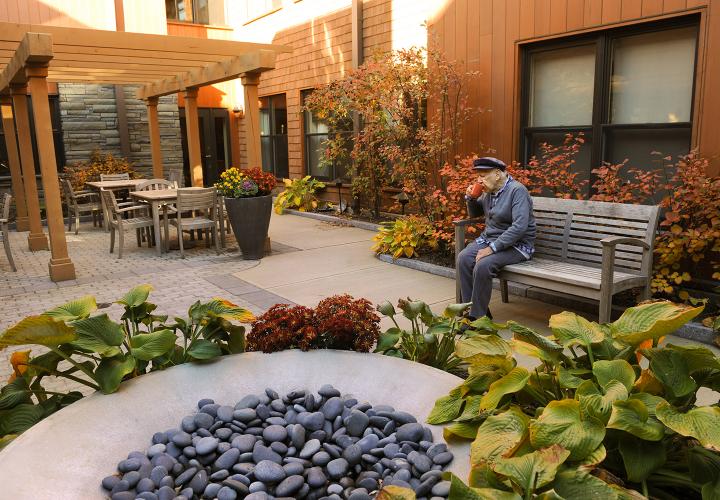Premier Charlotte Memory Care: Enhancing Quality of Life for Seniors
Premier Charlotte Memory Care: Enhancing Quality of Life for Seniors
Blog Article
What to Expect in Memory Care: A Thorough Guide to In-Home Services
As households come to terms with the obstacles of caring for a person with memory loss, the world of at home services supplies a lifeline of assistance and specialized treatment. Recognizing what to prepare for in memory care is important for making sure the wellness of both the specific with memory problems and their caretakers.
Daily Tasks and Regimens
Taking part in structured day-to-day activities and regimens is a fundamental part of supplying high quality look after people in memory care centers. These activities are diligently developed to provide to the details needs of locals with cognitive impairments, such as Alzheimer's disease or dementia. Daily regimens play a vital role in maintaining a sense of experience, safety and security, and purpose for individuals in memory care.

In addition, daily regimens aid people in memory care facilities to feel even more oriented and much less anxious. Uniformity in tasks and schedules can minimize complication and agitation, giving a sense of security and convenience. Caretakers and team member play a critical duty in promoting these tasks, making certain that each resident obtains customized and thoughtful treatment tailored to their unique choices and capacities.
Specialized Care Services
Within memory care centers, specialized treatment services are necessary to resolve the special demands and obstacles dealt with by people with cognitive problems such as Alzheimer's condition or dementia. These services are created to offer tailored support that accommodates the specific requirements of locals taking care of memory loss. Specialized treatment solutions in memory care facilities frequently consist of individualized treatment strategies, assistance with tasks of day-to-day living, drug management, and behavior therapies aimed at boosting top quality of life and lessening distress.
Additionally, memory treatment centers commonly provide organized programs and activities specifically made to promote cognitive feature and promote social involvement amongst homeowners. These activities might include memory-enhancing workouts, sensory stimulation treatments, and memory therapy sessions. In addition, specialized treatment services frequently involve normal monitoring of locals' health and wellness and wellness by skilled team member who are geared up to handle the special challenges connected with cognitive decline.
Safety Actions and Setting
Implementing rigid precaution and creating a protected setting are vital priorities in memory treatment centers to guarantee the wellness and security of locals with cognitive impairments. Safety and security in memory treatment starts with safe and secure structure style, consisting of locked doors and kept track of entrances to protect against citizens from roaming outdoors not being watched. Furthermore, facilities often have alarm and monitoring video cameras to check locals and respond promptly to any type of emergencies. Inside, the setting is very carefully intended to lessen risks, with handrails, order bars, and non-slip flooring to protect against falls. Furnishings is set up to help with easy navigating, and potentially hazardous products are secured away or eliminated. Team participants receive specialized training in managing emergencies, de-escalating tough behaviors, and making certain the security of locals in any way times. Regular security assessments are carried out to identify and attend to any kind of prospective risks quickly. By focusing on security actions and maintaining a safe setting, memory care centers aim to give a calming and protective setting for individuals with cognitive impairments.
Interaction and Engagement Approaches
With a concentrate on promoting meaningful communications and boosting quality of life, reliable communication techniques play a crucial function in supporting people in memory care facilities. Interaction in memory treatment entails understanding the distinct needs of homeowners that might have cognitive problems like mental deterioration. Simple language, clear instructions, and non-verbal hints such as gestures and face expressions are essential tools for effective communication. Caregivers should approach residents with patience, respect, and empathy, creating a supportive setting where individuals feel understood and valued.
Interaction methods are also important in memory treatment, assisting citizens remain active, promoted, and attached to their environments. Tasks like music therapy, art courses, reminiscence sessions, and sensory excitement can trigger memories, enhance mood, and advertise socialization. Customizing activities per person's abilities and rate of interests is crucial to promoting interaction and a sense of accomplishment. Additionally, including familiar objects, photos, and music from the person's past can supply convenience and stimulate positive memories. By focusing on personalized communication and interaction techniques, memory treatment centers can boost the overall health and lifestyle for their find out citizens.
Caregiver Assistance and Resources
Provided the Read Full Report vital role caregivers play in implementing effective communication and interaction approaches for residents in memory care facilities, giving sufficient support and sources is important to guarantee the wellness of both the caregivers and the individuals under their care. Caregivers in memory care settings typically deal with special obstacles that can influence their psychological and physical health. To address these challenges, various support systems and resources are available to assist caretakers in giving the most effective feasible treatment.
One necessary type of support is caregiver education and training programs. These programs equip caretakers with the essential abilities and understanding to successfully handle the behaviors and signs and symptoms connected with memory loss. Additionally, assistance teams provide caregivers the possibility to get in touch with others who are experiencing similar difficulties, offering a feeling of community and understanding.

Conclusion

Involving in structured everyday tasks and regimens is a fundamental element of giving quality care for people in memory treatment facilities.Within memory care facilities, specialized treatment solutions are important to attend to the unique requirements and difficulties encountered by people with cognitive impairments such as Alzheimer's illness or mental deterioration. Specialized treatment solutions in memory care facilities typically consist of individualized treatment strategies, help with tasks of daily living, medication administration, and behavior treatments intended at boosting top quality of life and minimizing distress.
Given the vital function caregivers play in carrying out reliable interaction and involvement strategies for residents in memory care centers, providing sufficient support and sources is necessary to make certain the health of both the caretakers and the people under their treatment. Daily tasks, specialized care services, safety steps, communication strategies, and caretaker assistance are vital elements of in-home memory care.
Report this page